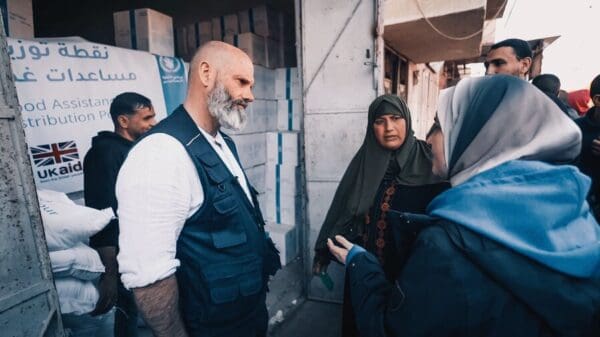Handing Over the Mic to Haitian Voices After Matthew

One of Laura Cantave’s favorite memories of growing up in Haiti involves a guava tree in her backyard.
There, at the very top of the tree, she and her siblings would often hide when they were in trouble.
LAURA CANTAVE: … we are watching them walk underneath us and they would walk back and they would spend hours looking for us and we were like little birds in the trees, like, ‘We’re not getting in trouble! We are staying here.
Thinking about that tree now, Laura is reminded of the natural beauty of her homeland, where the land is loved — and too often ravaged by natural disasters.
So when the World Food Program USA staffer received news that Haiti was in the pathway of Hurricane Matthew – a category 4 hurricane – she started to think about her loved ones back home.
Unfortunately, extreme weather like this is common in Haiti. At first, Laura didn’t think the storm would do much harm. But as the weather forecast worsened, so did her worries over the safety of her friends and family.
LAURA CANTAVE: … I don’t think I thought that it would bring as much damage as it did. And I don’t think any of us expected for it to be such a storm in that category. I’m still waiting to hear from my adopted family in the south, where I would go as a child and I hope to hear from them soon.
The hurricane, which struck Haiti’s southern coast on October 4th, would claim the lives of more than 800 people — leaving extensive flooding and mudslides, damage to roads and buildings and widespread electricity and water shortages.
Listen to the full podcast with Laura and Alexis below:
The World Food Programme (WFP) began distributing food to families in the southwestern town of Jérémie five days later, where the death toll was highest. As of today, WFP has distributed food assistance to almost 400,000 Haitians.
The Night of the Hurricane
Alexis Masciarelli, a communications officer with WFP, arrived to Haiti four days after the hurricane hit.
He talked with families in the towns of Jérémie and Les Cayes about what it was like to endure the slow-motion hurricane for more than 12 hours.
ALEXIS MASCIARELLI: … It was not just a tremor of an earthquake that lasted just 30 seconds, maybe a little bit more. It went on for hours and hours and hours with the wind howling with the branches falling with the trees cracking with the houses falling.
The Beauty and Plight of the South
The hardest hit areas of Haiti were in the south of the country.
It was a dear place in Laura’s heart given she and her family would travel there for family vacations to the beach as a way to get out of the city, Port-Au-Prince. Sleeping in open air, she was free to revel in the beauty of a part of the country that was wholly self-sufficient before the hurricane.
LAURA CANTAVE: My favorite memories are of the south because it’s so beautiful. We would drive to the south of the country. We would camp out. We would bring our tents, we would bring our plates, our forks, everything, our beds. And most of the time, we would end up sleeping outside. … No electricity, you would go to sleep when the sun goes down and wake up when the sun comes up.
Walking amid a landscape of demolished homes, broken tree limbs and mud-caked debris, Alexis was shocked at the devastation in the south.
ALEXIS MASCIARELLI: … Everything is gone. Agriculture is gone, nature is gone. That will take a long time, a long time to grow and it will take a long time for these people to become self-sufficient again.
What Does The Future Hold?
WFP’s first priority is to save lives. After that, helping Haitians feed themselves again will require time to rebuild Haiti’s agricultural systems, which could take as many as six to nine months.
Laura is confident that the Haitian people will recover from the impacts of Hurricane Matthew. She feels that way because she says the story of the Haitian people is built upon a history of adversity, struggle and resilience.
LAURA CANTAVE: The Haitian people are very resilient. The Haitian people are very strong about their sentiments. They’re very strong about their freedom. Essentially because we had to fight to get our freedom and we had to fight to get away from slavery … Because of that, it has built this dignity and prestige and loyalty in our culture.
Help WFP reach hungry families in need with lifesaving food.




